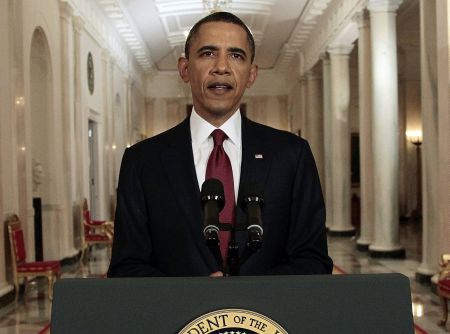WHEN Sohaib Athar (@Really Virtual) sent tweets out about the “rare event” – a helicopter hovering above Abbottabad, a city in Pakistan – a few nights ago, he didn’t imagine that he would be credited with “breaking” such an important piece of news.
In fact, it was such an insignificant moment, that the second tweet was in jest: “Go away helicopter – before I take out my giant swatter :-/”.
The helicopter was one of four in a raid held to capture Al Qaeda’s Osama bin Laden, which eventually led to his death.
Of course, no one (besides those who were clued in about the raid) knew about the incident Sohaib was tweeting about.
In fact, the Twitterverse only went on an #osama and #OBL rampage after @KeithUrbahn tweeted: “So I’m told by a reputable person they have killed Osama Bin Laden. Hot damn”. This has been credited by many news sources as the first tweet about the attack.
It appeared even before US president Barack Obama officially announced the news.
Like most major news that has “broken” on Twitter, the frantic search to find the early tweeters is a given. This would be followed by the announcement, often by advocates of social media’s prowess, that Twitter has once again trumped the traditional media.
Considering the number of breaking news we’ve gotten on Twitter, I wonder if we’re not tired of the same rethoric yet.
Ever since Janis Krums posted that now-iconic picture of the US Airways plane that crashed into the Hudson River in New York in 2009, Twitter has been credited with breaking the news of several significant events and incidents.

The picture posted by Janis Krums on Twitter of the US Airways flight that crash landed on the Hudson River.
Many – the traditional media included – have acknowledged social media’s speed in terms of information dissemination. It is this realisation that has led to the many debates about the journalism industry, the downfall of traditional media, and social media’s role in this “phenomenon”.
The fact is that it is not the ability to “scoop” the traditional media that makes social media what it is. Social media does not exist in isolation and is most powerful when used to complement and mobilise action.
That is why it is time we move on from focusing on the breaking news factor and instead look at other elements that social media can offer. Perhaps, we should start asking more often: “What can social media do after the news has broken?”
We have already seen examples of this happening in the past few months.
In Japan recently, when the tragic earthquake happened, social media aided in the search efforts (through Google’s “Person Finder”) and in sending out tsunami alerts. In North Africa, and the Middle East, it was the conversations happening on social media that served as an enabler for the revolutions.
I also found Sohaib’s tweets (such as when he posted on Twitpic, “life in Abbottabad”, around the time of Obama’s announcement) to be most interesting in the news development of Osama’s death on Monday. Then there were also the use of Google Maps to indicate the location of the raid.
These examples indicate that it is in action that social media reigns supreme.
Online media company GigaOm, in an article titled The stages of news in a Twitter and Facebook era, wrote: “Action. This is where Facebook and social media really shine. From tweets about people seeking more information from friends to those seeking to find out if others are meeting at Ground Zero by checking out a live web cam of the site, people now can learn about news and do something.”
Many social media advocates will tell you that we haven’t seen anything yet when it comes to the real power of these networks. With each new incident and event happening around the world, we are seeing ingenius new ways in which people are using social media. We live in exciting times, where technology is concerned, but for me, it is in the anticipation of what is to come that is keeping me on the edge of my seat.


Tell us what you think!